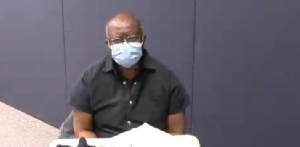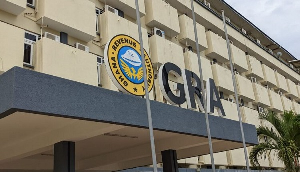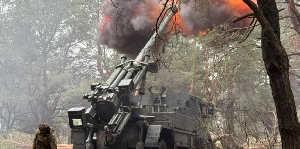By Kwame Okoampa-Ahoofe, Jr., Ph.D.
When Mr. Kwamena Duncan asserts that the late President John Evans Atta-Mills ought to be squarely blamed for the current economic problems plaguing the country, the Central Regional Secretary of the main opposition New Patriotic Party (NPP) exaggerates matters quite a bit (See "Blame Mills for Economic Woes - Kwamena Duncan" JoyOnline.com / Ghanaweb.com 7/24/13).
While it is absolutely accurate to observe that President Mills' unprecedented political lethargy critically compounded the economic problems of the country, it is Prof. Mills' mentor, Chairman Jerry John Rawlings, who ought to squarely bear the brunt of the blame for effectively grinding Ghana's economic development to a screeching halt during his 19 years of faux-socialist dictatorship, including 8 years spent as a constitutionally elected dictator of Ghana's Fourth Republic.
On the latter score, President Mills may be aptly faulted for having been integral to the Rawlings-wreaked economic disaster as a one-term Vice-President and before the latter, as leader of Mr. Rawlings' Economic Recovery Team or some such adhoc establishment. Prof. Mills' spearheading of the infamous Aveyime Rice Irrigation Project caper, in which over $20 million of taxpayer money was literally gifted an African-American welfare queen resident in the state of Georgia, for absolutely no contractual work fulfilled on the project, also remarkably contributed to the economic regression of the country.
What is curious here, however, is the fact that rather than being disciplined for such gross incompetence, and patent act of criminality, to be certain, Chairman Rawlings rather decided to promote his feckless lieutenant to a three-season presidential candidacy of the National Democratic Congress (NDC). It therefore came as hardly any surprise that President Mills would exhibit unprecedented administrative incompetence in the annals of Ghanaian presidential politics.
But we ought to quickly point out that Chairman Rawlings was equally a "revolutionary" Ghanaian economic disaster, having also summarily dismantled the public base of the country's industrial development, by callously quartering up the Nkrumah-established Ghana Industrial Holdings Corporation (GIHOC) among his cronies, relatives and family members at prices well below their original market value. Talk of transparency, probity, accountability and revolutionary justice!
Of course, the problem of Ghana's economic underdevelopment goes far beyond Messrs. Rawlings and Mills - it is fundamentally a slavo-colonial problem but more importantly, it is the direct result of the massive failure of the country's first postcolonial leader to wean our largely extractive industrial economic structure into one of manufacturing and an efficient service production base. Instead of focusing on whatever viable economic productivity the GIHOC factories could provide, Mr. Kwame Nkrumah chose to almost exclusively focus his attention and oversized ambitions on pan-Africanist ideological abstractions, to the detriment of the steady, systematic and rapid industrial and technological development of the country.
Needless to say, the establishment of the Ghana Industrial Holdings Corporation (GIHOC) went impracticably far ahead of the indigenous skills training necessary to manage such a sophisticated modern industrial complex. The effective bankrupting of the nation's economy in the cause of pan-Africanism also did not help matters. However, I am in lock-step agreement with Mr. Duncan, the New Patriotic Party's Central Regional Secretary, that President Mills was most guilty on the cultural front. "According to [Mr. Duncan], although President Mills admonished political commentators to avoid the use of insults during radio discussions, his own party commentators were doing otherwise while he just sat down and looked on."
This is not wholly surprising, since as Vice-President to Chairman Rawlings, Prof. Mills was widely known to have kept mum, like a thousand-year-old mummy, while victims and political opponents of some key operatives of the so-called National Democratic Congress were meted what widely came to be known as "Identification Haircuts." Regarding the latter, large pieces of broken bottles, or shards, were converted into makeshift scissors to literally scrape the "mane" off the skulls of these specially targeted "enemies of the revolution."
What puzzles me, though, is the alacrity with which monuments are being named after this man who all he appears to have done was to have merely been lucky enough to have been selected by Chairman Rawlings as his arch-lieutenant, and then unilaterally imposed on the National Democratic Congress as three-time flagbearer and three-year president of Ghana. On the sprawling campus of the country's flagship academy, the University of Ghana, Legon, for example, a law school building has been named after Prof. Mills. The man once taught there.
But juxtapose this with the fact that Dr. J. B. Danquah, the de facto founder of the University of Ghana, does not even have a footpath named after him on that campus. Anyway, as he is widely, both directly and obliquely, quoted to have said while terminally incarcerated in a condemned cell at the Nsawam Medium-Security Prison: "Is Ghana worth dying for?"
____________________________________________________________
*Kwame Okoampa-Ahoofe, Jr., Ph.D.
Department of English
Nassau Community College of SUNY
Garden City, New York
August 23, 2013
E-mail: okoampaahoofe@optimum.net
###
Opinions of Tuesday, 3 September 2013
Columnist: Okoampa-Ahoofe, Kwame














